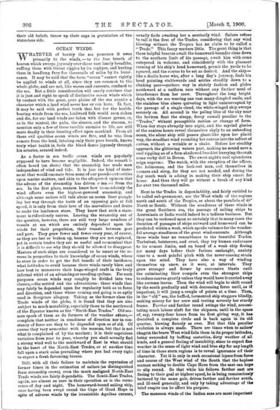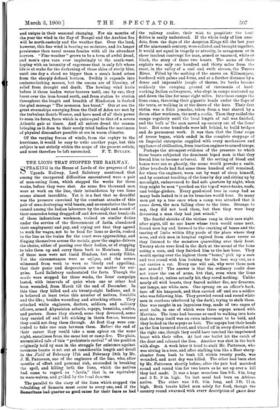OCEAN WINDS.
WHATEVER of beauty the sea possesses it owes primarily to the winds, — to the free breath of heaven which sweeps joyously over those vast lonely breadth; ruffling them with tiniest ripples by its zephyrs, and hurling them in headlong fury for thousands of miles by its hurri- canes. It may be said that the term "ocean" cannot rightly be applied to winds at all, einee they are common to the whole globe, and are not, like waves and currents, confined to the sea. But a little consideration will surely convince that it is just and right to speak of distinctive ocean winds which by contact with the great, pure plains of the sea acquire a character which a land wind never has or can have. In fact, it may be said with perfect truth that but for the health- bearing winds from the sea, landward folk would soon sicken and die, for our land winds are laden with disease germs, or, as in the mistral, the puna, the sirocco, and the simoom, to mention only a few of these terrible enemies to life, are still more deadly in their blasting effect upon mankind. From all these evil qualities ocean wines are free, and he who lives remote from the land, inhaling only their pure breath, knows truly what health is, feels the blood dance joyously through his arteries, aerated indeed.
As a factor in sea traffic ocean winds are popularly supposed to have become negligible. Indeed, the remark is often heard (on shore) that the steamship has made man independent of wind and tide. It is just the kind of state- ment that would emanate from some of our pseudo-authorities upon marine matters, and akin to the oft-quoted opinion that the advent of the steamship has driven r, ma ire from the sea. In the first place, seamen know how tremendously the wind affects even the highest-powered steamship, and although some sailors will talk about an ocean liner plough- ing her way through the teeth of an opposing gale at full speed, it is only from their love of the marvellous and desire to make the landsman stare. They know that such a state- ment is ridiculously untrue. Leaving the steamship out of the question, however, there are still very large numbers of vessels at sea which are entirely dependent upon the winds for their propulsion, their transit between port and port. They grow fewer and fewer every year, of coarse, as they are lost or broken up, because they are not replaced, yet in certain trades they are so useful and economical that it is difficnit to see why they should be allowed to disappear. Masters of such ships are considered to be smart or the re- verse in proportion to their knowledge of ocean winds, where to steer in order to get the full benefit of their incidence, what latitudes to avoid because there winds rarely blow, and how best to manceuvre their huge-winged craft in the truly infernal whirl of an advancing or receding cyclone. For such purposes ocean winds may roughly be divided into two classes,—the settled and the adventitious: those winds that may fairly be depended upon for regularity both as to force and direction, and those whose coming and going is so aptly used in Scripture allegory. Taking as the former class the Trade winds of the globe, it is found that they are also subject to much mutability, especially those to the northward of the Equator known as the "North-East Trades." Old sea- men speak of them as do farmers of the weather ashore,— complain that neither in steadiness of direction nor in con- stancy of force are they to be depended upon as of old. Of course they vary somewhat with the seasons, but that is not what is complained of by the mariner ; it is their capricious variation from year to year, whereby you shall actually find a strong wind well to the southward of East in what should be the heart of the North-East Trades, or at another time fall upon a stark calm prevailing where you had every right to expect a fresh favouring breeze.
Still, with all their failure to maintain the reputation of former times in the estimation of sailors (as distinguished from steamship crews), even the much maligned North-East Trade winds are fairly dependable. The South-East Trades, again, are almost as sure in their operation as is the recur- rence of day and night. The homeward-bound sailing ship, once having been swept round the Cape of Good Hope in spite of adverse winds by the irresistible Agulhas cureent, usually finds awaiting her a southerly wind. Sailors refuse to call it the first of the Trades, considering that any wind blowing without the Tropics has no claim to be called a "Trade." This fancy matters little. The great thing is that these helpful breezes await the homeward-bounder close down to the southern limit of his passage, await him with arms outspread in welcome, and coincidently with the pleasant turning of his ship's head homeward, permit the yards to be squared, and the course to be set as desired. And the ship— like a docile horse who, after a long day's journey, finds his head pointing stablewards and settles steadily down to a clinking pace—gathers way in stately fashion and glides northward at a uniform rate without any farther need of interference from her crew. Throughout the long bright days, with the sea wearing one vast many-dimpled smile, and the stainless blue above quivering in light uninterrupted by the passage of a single cloud, the white-winged ship sweeps serenely on. All around in the paling blue of the sky near the horizon float the sleepy, fleecy cumuli peculiar to the "Trades," without perceptible motion or change of form. When day steps abruptly into night, and the myriad glories of the sunless hours reveal themselves shyly to an unheeding ocean, the silent ship still passes ghost-like upon her placid way, the steadfast wind rounding her canvas into the softest of curves, without a wrinkle or a shake. Before her stealthy approach the glittering waters part, making no sound save a cool rippling as of a fern-shadowed brooklet hurrying through some rocky dell in Devon. The sweet night's cool splendours reign supreme. The watch, with the exception of the officer, the helmsman, and the look-oat man, coil themselves in corners and sleep, for they are not needed, and during the day much work is adoing in making their ship smart for home. And thns they will go without a break of any kind for over two thousand miles.
Next to the Trades in dependability, and fairly entitled to be called sub-permanent, are the Weet winds of the regions north and south of the Tropics, or about the parallels of 46' North or South. Without the steadiness of these winds in the great Southern sea, the passage of sailing ships to Australasia or India would indeed be a tedious business. Bat they can be reckoned upon so certainly that in many cases the duration of passages of ships outward and homeward can be predicted within a week, which speaks volumes for the wonder- ful average steadiness of the great wind-currents. Although these winds bear no resemblance to the beautiful Trades. Turbulent, boisterous, and cruel, they try human endurance to its utmost limits, and on board of a weak ship fleeing for many days before their furious onslaught, anxiety rises to a most painful pitch with the never-ceasing strain upon the mind. They have also a way of winding themselves up anew, as it were, at intervals. They grow stronger and fieraer by successive blasts until the culminating blow compels even the strongest ships to reduce canvas greatly unless they would have it carried away like autumn leaves. Then the wind will begin to shift round by the south gradually and with decreasing force until, as if impatient, it will jump a couple of points at a time. Then, in the "old" sea, the baffled, tormented ship staggers blindly, making misery for her crew and testing severely her sturdy frame. Farther and farther round swings the wind, necessi- tating much labour aloft for the shipmen, until in the space of, say, twenty-four hours from its first giving way, it has described a complete circle and is back again in its old quarter, blowing fiercely as ever. Not that this peculiar evolution is always made. There are times when to sailors' chagrin the brave West wind fails them in its proper latitudes, being succeeded by baffling easterlies, dirty weather of all kinds, and a general feeling of instability, since to expect fine weather in the sense of light wind and blue sky for any length of time in those stern regions is to reveal ignorance of their character. Yet it is only in such occasional lapses from force and course of the West wind of the South that the hapless seaman seeking to double Cape Horn from the east can hope to slip round. So that while his fellows farther east are fleeing to their goal at highest speed, he is being remorselessly battered by the same gale, driven farther and farther south, and ill-used generally, and only by taking advantage of the brief respite can he effect his purpose.
The monsoon winds a the Indian seas are most important and unique in their seasonal changing. For six months of the year the wind in the Bay of Bengal and the Arabian Sea will be north-easterly and the weather fine. Over the land, however, this fine wind is bearing no moisture, and its longer persistence than usual means famine with all its attendant horrors. "Fine weather" grows to be a term of awful dread, and men's eyes turn ever imploringly to the south-west, hoping with an intensity of eagerness that is only felt where life is at stake for the darkening of those skies of steely blue, until one day a cloud no bigger than a man's hand arises from the sharply defined horizon. Swiftly it expands into ominous-looking masses, but the omens are of blessing, of relief from drought and death. The howling wind hurls before it those leaden water-bearers until, one by one, they burst over the iron-bound earth, and from station to station throughout the length and breadth of Hindostan is flashed the glad message "The monsoon has burst." Out at sea the great steamships emerging from the Gulf of Aden are met by the turbulent South-Wester, and have need of al' their power to stem its force, force which is quite equal to that of a severe Atlantic gale at times. And all sailors dread the seasons bringing as it does to their sorely tried bodies the maximum of physical discomfort possible at sea in warm climates.
Of the varying forces of winds, from the zephyr to the hurricane, it would be easy to write another page, but this subject is not strictly within the scope of the present article,
and must therefore be left untouched. F. T. BULLEN.







































 Previous page
Previous page